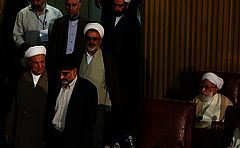Rafsanjani Officially in Race for the Leadership Council
About three months before the elections for the Experts Assembly on Leadership which constitutionally reviews the work of Iran’s top leader, veteran politician Hashemi Rafsanjani who led the Assembly in the past, has announced that he will be a candidate for the 86-member body in February. This is the second time in recent months that Rafsanjani announces his desire to run.
Earlier in February, Rafsanjani characterized the February 2016 Majlis and Leadership council elections to be “one of the most decisive elections in the history of the Islamic republic” and added, “The elections must be held in a manner that strengthen the trust of people and society for creating another political epic and I too will, God desiring, join as well.” The words “another political epic” are a reference to the unexpected victory of Hassan Rouhani in the 2013 presidential elections.
Rafsanjani’s reiteration that he will run in the Leadership council race is significant because in the past few elections (ninth for the president, eleventh for the president and the last Leadership Council elections), he did not announce his clear-cut run vs no-run decision until very close to the election day.
Iran’s hardliners (commonly known as Principlists) accuse Rafsanjani and associates of Rouhani of getting close to the moderates for the purpose of getting their candidates into the Leadership council. This issue has turned the possible entry of ayatollah Khomeini’s grandson – seyed Hassan Khomeini – into the race into a controversy as well.
For months now, hardliners in Iran have been issuing warnings about the February elections and the possible changes they could bring to the composition of the Majlis and the Leadership council. For example, Ahmad Khatami, the current temporary Friday prayer leader of Tehran and a deputy Speaker of the Majlis had said that some people were busy trying to “change the current mix of the Majlis” and that they were after a “strong faction.” He added that in some quarters the talk had been that while this group could not gain the majority in the Majlis, it could form a strong faction. He then revealed that while concern for the mix of the Majlis and the Leadership council had always existed, “it must more serious this time.”
The fifth elections for the Experts Assembly on Leadership and the next Majlis elections will take place in Iran on February 26, 2016. Official registration will begin on December 17 this year.
Some of the leaders of the hardliners such as Dori Najafabadi and Movahedi Kermani both members of the Leadership council, have also indicated their concerns regarding the next leader of Iran. They have publicly said that the Leadership council had to be seriously thinking about the next leader as this next session may have to elect a new leader. “Ayatollah Khamenei is currently 74 years old and will be 82 in the next 8 years and some are thinking that the next Leadership council may have to decide on the next leader,” they have said.
Khamenei is currently 75 years and his hospitalization earlier this year has prompted talk about his successor.
Ahmad Janati, the secretary of the Guardian Council – another critical state agency – has said that the next elections for the Leadership council are “very important” because some groups were planning to take over its control, calling on his supporters to be “alert and wise” in their actions in this regard.
The Leadership council has 86 members and elections for it are held every eight years. Article 107 of the constitution gives this body the responsibility of choosing the supreme leader of the country. The organizations under the control of the supreme leader also fall under the purview of Leadership council.

